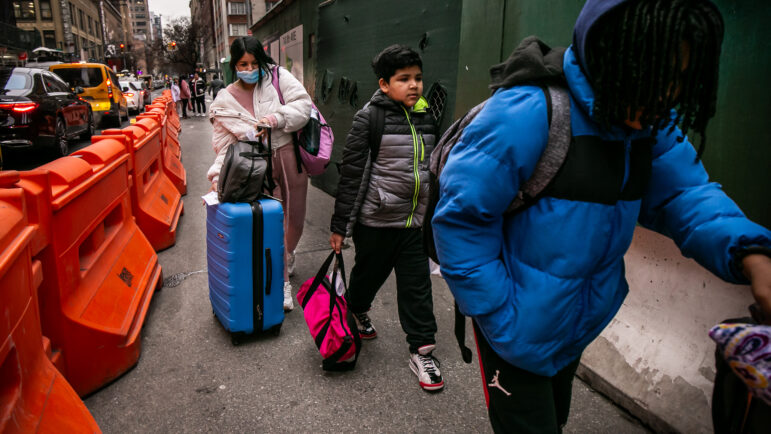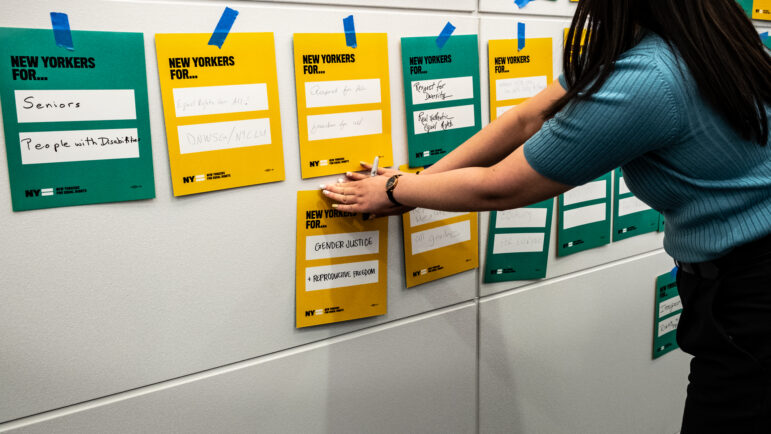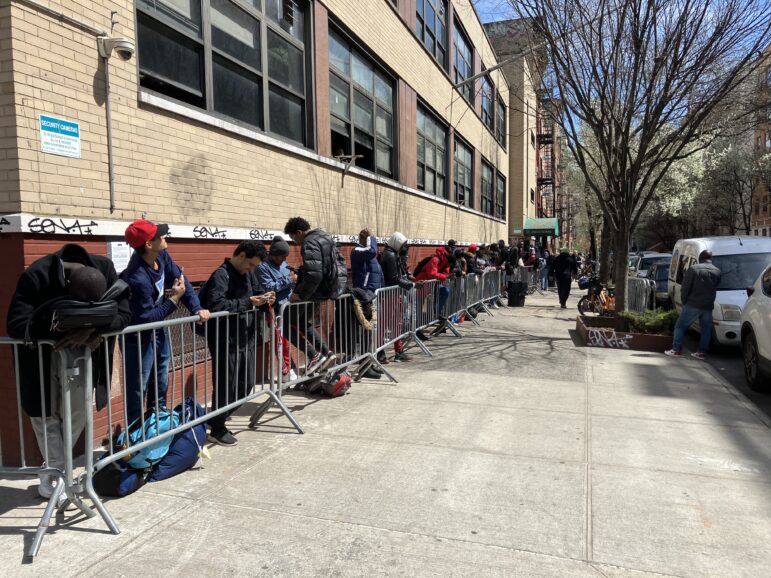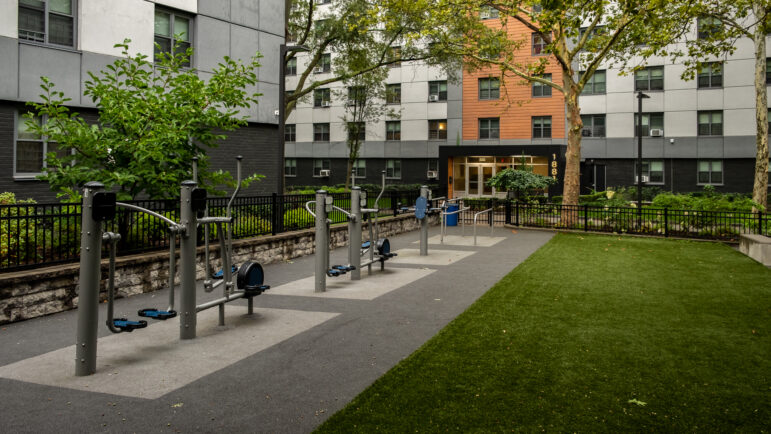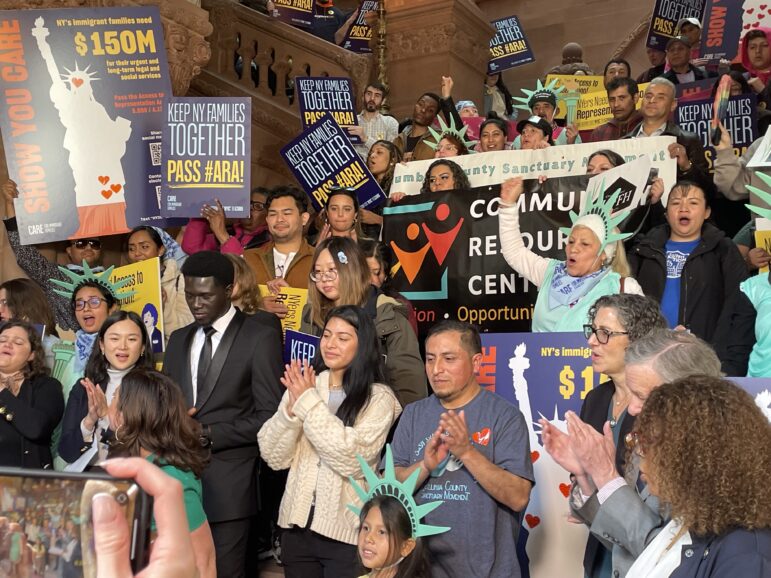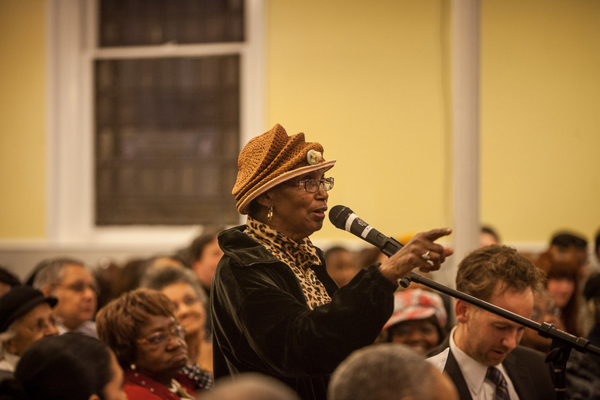
Photo by: Anthony Lanzilote
Blanche Romey, a leader from St. Thomas Episcopal Church, speaks during a Mayoral Candidates Forum at the First Presbyterian Church in Jamaica Queens.
It certainly seemed no coincidence that just two hours before the Metro Industrial Areas Foundation’s mayoral forum on public safety on March 19, mayoral hopeful Christine Quinn announced her support for an inspector general to oversee the police department. Yes, simultaneously a trial challenging stop-and-frisk was proceeding in Federal District Court in Manhattan, but Quinn’s sudden change of position before facing the crowd of 1,000 at the First Presbyterian Church of Jamaica suggested the kind of seriousness with which politicians take the power of Metro-IAF, a nearly 40-year-old community-based activist coalition.
It’s a power that Metro-IAF is using in a different arena—by trying, for the first time, to put its footprint on a mayoral race in New York City. Before the forum on public safety, Metro-IAF had the candidates out to discuss housing in January and, in February, to talk about education. The Daily News has been a co-sponsor of all three events.
Until now, Metro-IAF’s strategy—seen through its 30-year Nehemiah Homes project that created over 5,000 low-income housing units or its push for mayoral control and the creation of six new schools in the Bronx and Brooklyn—has been to work behind the scenes with people in power. If anything, the organization’s attitude has been: we can work with anyone, or as Grant Lindsay, the senior Metro-IAF organizer for East Brooklyn Congregations, puts it, “We have no permanent allies and no permanent enemies.”
Now Metro-IAF is helping to shape the race that will decide who gets into office for them to work with. The decision to run the forums came in response to the presidential campaign last fall, says Lindsay. “It felt like a circus,” he says of the 2012 debates. “Nonsensical talking points with very little to do with major issues.”
So for the mayoral election, Metro-IAF is moving from one-on-one meetings with sitting mayors and their commissioners and city agencies, to impacting the issues and how they are framed. They’re doing this through forums where a candidate’s chance to grandstand is limited by the seriousness and specificity of the questions members ask, forcing hopefuls to come prepared to talk about—or later bone up on—the issues facing the members of Metro-IAF and to a large extent, lower-income New Yorkers in general.
Some like it hot
The Industrial Areas Foundation was founded by community organizer Saul Alinsky in Chicago in 1940. Alinsky, who died in 1971 and has now reached iconic status, famously wrote in his slim volume, Rules for Radicals: “Action comes from keeping the heat on. No politician can sit on a hot issue if you make it hot enough.”
In a certain sense, that’s what East Brooklyn Congregations (EBC), Empowered Queens United in Action and Leadership (EQUAL), South Bronx Churches and Manhattan Together (the largest of the constituent groups in Metro-IAF) have done with the forums: defining the issues and making sure politicians answer their questions.
And they brought the force of 118 churches, synagogues, mosques, schools and other community groups to bear directly on candidates, many of whom did not seem used to such policy-infused questions. As Rev. David Brawley, the pastor of St. Paul’s Community Baptist Church in East New York and chair of EBC, warned the candidates before the forum on public safety, “We expect you to have a plan to protect the gains of the last 23 years [when crime dropped precipitously in the city.] We don’t want to applaud simplistic slogans.”
While all candidates seemed eager to talk about stop-and-frisk, some seemed less prepared when Blanche Romey, who has worked for two years with local precinct commanders to shut down drug sites on her block, asked them to give “the three most important strategies that you will use to drive crime down lower than today.”
Adolfo Carrion, Jr., the former Bronx borough president, seemed to run out of ideas when he got to number three. He spoke of restoring community policing, getting illegal guns off the street and being “firmly focused on fighting global terrorism.”
John A. Catsimatidis, the Gristedes grocery chain owner, spoke about getting more cops on the street and giving them “proper information devices—mobile phones and equipment for cops to cover more ground—bicycles, tricycles or ATVs.”
Almost every candidate used the word “community” in their response about what should be done to bring crime down. It became the word of the evening, even more than “stop-and-frisk” which moderator Errol Louis of NY 1 banished to one section of the forum, to prevent it from being used as a rallying cry.
Public Advocate Bill de Blasio called for “a fundamental holistic change between the police and the community.”
City Comptroller John Liu said “We can’t drive down the numbers and ignore the problems in the community.” He called for “greater economic development and putting people back to work.”
Joseph J. Lhota, Rudy Giuliani’s former deputy mayor told the audience that “We need more community involvement from when Bill Bratton was police commissioner.” He called for “more community sensitivity” and “transparency.”
Richard Gibbs, a former police officer, asked the candidates their responses to the idea of using the buying power of the NYPD to put pressure on gun shops. Police officers get vouchers to buy their own weapons from a list of approved gun dealers. “We’ve been able to trace guns bought illegally to particular gun shops,” said Rev. Patrick O’Connor of the First Presbyterian Church of Jamaica. “If the police department were really committed, they could use their purchasing power to say don’t buy guns from those gun shops.”
Louis asked for a show of hands from the candidates who thought it was a good idea and all of them voted for it except Catsimatidis, yet no one seemed to have considered it before it was raised by the questioner.
Getting specifics
During the housing forum, held on January 24 at St. Paul’s Community Baptist Church, Metro-IAF members also asked tightly focused questions like: “Mayor Bloomberg’s administration created 165,000 units of affordable housing over his three terms. That works out to 13,750 units a year. Would you pledge to increase the number to 15,000 a year for a total of 60,000?” All six candidates who were running at that point made the pledge—and were then asked very specifically where they would get the money to pay for it. Liu said he would invest public pension funds. De Blasio said he would recruit mayors around the country in the way that Mayor Bloomberg has done around guns, to push Congress to invest in low-income housing (and to defeat Tea Party-backed opposition.)
Liu, de Blasio and former Comptroller William Thompson all said they would use zoning laws to push developers into building affordable units.
And yet the biggest news of the night—at least to The New York Times which headlined it “Unexpected Focus at the Mayoral Forum”—was mold, particularly in New York City Housing Authority (NYCHA) apartments, where many Metro-IAF members live. To those members, however, mold isn’t really news; in fact, as residents of NYCHA, they’ve long been demanding eradication of mold, which grows and spreads when leaky pipes are not repaired and causes respiratory problems and exacerbates asthma.
In November 2010, Metro-IAF met with Housing Authority chair John Rhea, along with then-Deputy Mayor Dennis Walcott to push NYCHA to go after millions in federal funds for roof and brickwork repair though the federal Department of Housing and Urban Development. “He said even if they spent the money, they didn’t have qualified staff to do it,” Marielys Divanne, an EBC organizer, told the Daily News. They met with him again in January 2011 where he repeated the same thing.
Finally Metro-AIF wrote a September 26, 2011 letter to Bloomberg.
“NYCHA seems to lack the capacity to put credible applications together for these desperately needed funds,” they wrote.
The week after the mayoral forum on housing issues, Bloomberg announced at a press conference at the Drew-Hamilton Houses in East Harlem that his administration would spend an extra $40 million to have the 420,000 backlogged repair requests cleaned up by the end of his term. Previously, 10,000 of those requests had not been scheduled for resolution until Dec. 2014.
More than a few Metro-IAF members are skeptical that NYCHA will deliver. “Are they going to really respond and fix the leaks and the problems” asked Father Ed Mason, of Our Lady of Mercy and Our Lady of Presentation Church in Brownsville, “or is the inspector just going to come out? Are they going to fix them or are they going to just paint over the mold?”
Nuanced views on schools
Other than housing, it is in the education arena that Metro-IAF has worked the longest. In 2002, just as Bloomberg was taking over as mayor, Rev. Johnny Ray Youngblood, then-pastor at St. Paul’s Community Baptist Church and co-chair of Metro-IAF, and Sr. Kathy Maire—lead organizer of Upper Manhattan Together—wrote an op-ed in the New York Post entitled “Drain NYC’s School Swamp,” calling for mayoral control of the schools. They referred to 200 schools in “education dead zones,” neighborhoods where generations of students have been forced to go to failing schools. “A portion of the system is bankrupt—condemning nearly a quarter of a million of the city’s most vulnerable students and families to a lifetime of intellectual debt,” they wrote.
Three Bloomberg terms later, at the mayoral forum on schools in February, mayoral candidates were confronted with questions about the impact of some of the policies instituted under mayoral control.
Angela Pruitt, who is assistant principal for the Academy for Young Writers in East New York, asked a question about the different sets of rules for charter schools and regular public schools. She asked candidates if they would support legislation requiring charter schools to accept the most educationally needy students—like English language learners, special education students and kids less educationally prepared—at the same rates as regular public schools.
It was clearly something many candidates had not thought about.
The two candidates to whom the question was addressed used the question to weigh in on charter schools in general, with Liu calling for a moratorium on forced co-location of charter schools within existing public schools and Lhota going full blast on the importance of charter schools: “We have to have the competition that charter school provide,” he said.
“A lot of the candidates are not ready on the ground,” said Pruitt, who has worked for 19 years as a teacher and now an assistant principal, a few days later. “Mayoral control is here to stay. But whoever is going to become mayor has to have an intimate understanding of the issues. They’re going to need our help—parents, families, stakeholders. How do we help them understand those issues?”
Metro-IAF has no plans to ultimately endorse a candidate, though they will perhaps run more forums in the fall once the number of candidates is whittled down through the primaries to two or three. “If you endorse someone,” says Lindsay, “you end up having very little impact.”
Read more City Limits campaign coverage.


